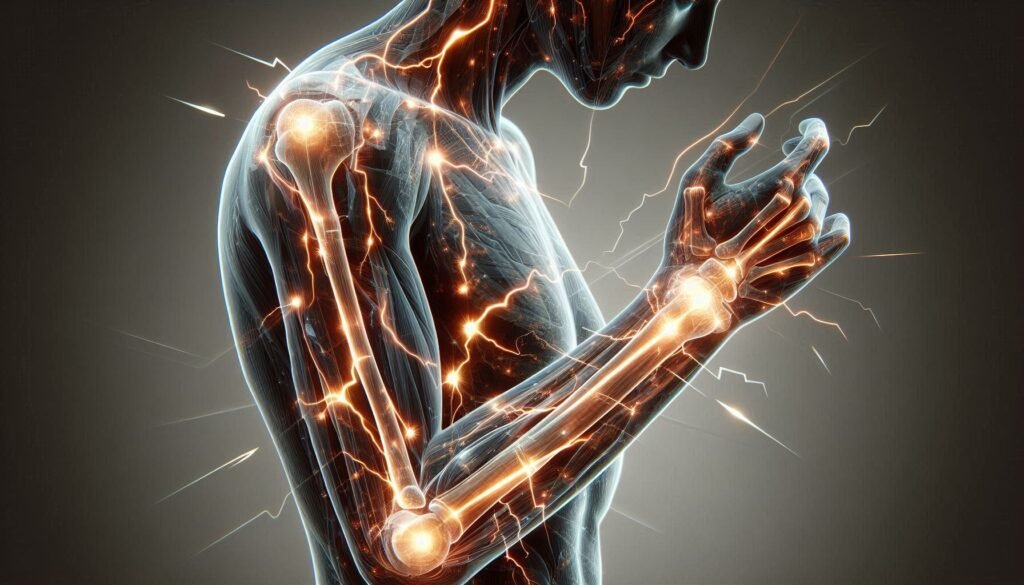Thyroid disorders are often overlooked, yet they can significantly impact various aspects of our health. Among these effects is paresthesia, a condition characterized by tingling, numbness, or a pins-and-needles sensation in the extremities. This connection between thyroid dysfunction and nerve-related symptoms may surprise many.
Understanding how the thyroid gland influences our nervous system is crucial for recognizing and managing these complex interactions. Whether it’s hypothyroidism leading to nerve issues or hyperthyroidism causing its own set of complications, being informed can empower those affected to seek appropriate treatment. Join us as we explore the intricate relationship between thyroid disorders and their connection to paresthesia, unraveling the mysteries behind this often-misunderstood phenomenon.

The Thyroid Gland: Functions and Impact on the Nervous System
The thyroid gland, a butterfly-shaped organ located in the neck, plays a vital role in regulating metabolism and energy levels. It produces hormones such as thyroxine (T4) and triiodothyronine (T3), which influence nearly every cell in the body. These hormones help control various functions, including heart rate, temperature regulation, and body weight.
In addition to these metabolic roles, thyroid hormones significantly impact the nervous system. They contribute to brain development during infancy and childhood while also maintaining cognitive function throughout adulthood. An optimal level of thyroid hormones is essential for proper nerve signaling and communication between neurons.
When thyroid hormone production is disrupted due to disorders like hypothyroidism or hyperthyroidism, it can lead to neurological symptoms. Imbalances may affect nerve health by altering blood flow or causing inflammation within the nervous system.
Understanding this connection helps highlight why monitoring thyroid function is crucial for overall well-being—especially when experiencing unusual sensations like paresthesia.
Hypothyroidism: How Low Thyroid Function Leads to Paresthesia
Hypothyroidism occurs when the thyroid gland does not produce enough thyroid hormones. This deficiency can disrupt various bodily functions, including metabolism and energy levels. One lesser-known consequence of hypothyroidism is paresthesia, which refers to abnormal sensations like tingling or numbness in the limbs.
The connection between low thyroid function and nerve health lies in how thyroid hormones influence peripheral nerves. Insufficient hormone levels may impair blood flow to these nerves, leading to reduced oxygen supply. As a result, neurons might become damaged or less responsive.
Moreover, hypothyroidism can cause fluid retention and swelling that compresses adjacent nerves. When this happens, individuals may experience discomfort or unusual sensations in their extremities.
Recognizing these symptoms early is crucial for effective management of hypothyroidism-related paresthesia. Addressing low thyroid hormone levels can significantly alleviate nerve-related issues and improve overall quality of life for those affected.
Hyperthyroidism and Its Neurological Manifestations
Hyperthyroidism is characterized by an overproduction of thyroid hormones, which can significantly impact various bodily systems, including the nervous system. The heightened levels of these hormones stimulate the metabolism and can lead to a range of neurological symptoms. Patients often report feelings of anxiety, irritability, and restlessness.
One notable manifestation is tremors, commonly experienced as involuntary shaking in the hands or fingers. This symptom occurs due to increased nerve excitability stemming from excessive thyroid hormone levels. Alongside tremors, individuals may also face difficulties with concentration and memory retention.
In some cases, hyperthyroidism can cause peripheral neuropathy. This condition arises when high hormone levels damage peripheral nerves that transmit signals between the brain and spinal cord to other parts of the body. Symptoms can include numbness or tingling sensations primarily in extremities.
Additionally, mood swings are prevalent among those with hyperthyroidism. Fluctuating emotions are linked directly to hormonal imbalances affecting neurotransmitter activity in the brain.
Hashimoto’s Thyroiditis: An Autoimmune Cause of Paresthesia
Hashimoto’s Thyroiditis is an autoimmune disorder that affects the thyroid gland. In this condition, the immune system mistakenly attacks healthy thyroid tissue. This leads to inflammation and impaired hormone production. Consequently, individuals may experience various symptoms, including fatigue, weight gain, and sensitivity to cold.
One lesser-known symptom of Hashimoto’s is paresthesia—tingling or numbness in extremities. The decrease in thyroid hormones can disrupt nerve function and lead to these sensations. As nerve endings become less responsive due to insufficient hormone levels, patients might notice unusual feelings in their hands or feet.
Moreover, chronic inflammation from Hashimoto’s can affect blood flow and increase pressure on nerves. This adds another layer of complexity when understanding why some people develop paresthesia alongside other common symptoms of hypothyroidism.
Addressing Hashimoto’s requires a comprehensive approach that includes regular monitoring of thyroid levels and appropriate treatment strategies tailored specifically for each individual’s needs.
Graves’ Disease: Hyperthyroidism and Nerve Function
Graves’ disease is an autoimmune disorder that leads to hyperthyroidism. This condition causes the thyroid gland to produce excessive amounts of thyroid hormones, which can significantly impact various body systems, including nerve function. Elevated hormone levels increase metabolism and energy production but can also lead to nervous system complications.
Patients with Graves’ disease often report symptoms such as anxiety, tremors, and rapid heart rate. These manifestations indicate heightened sympathetic nervous system activity. Additionally, some may experience paresthesia—tingling or numbness in the extremities—as a direct result of altered nerve function due to hormonal imbalances.
The role of antibodies in Graves’ disease cannot be overlooked. The presence of specific antibodies impacts how nerves communicate and function. Inflammation around nerve tissues might occur, leading to compromised signal transmission.
Monitoring these neurological symptoms is crucial for individuals diagnosed with Graves’ disease. Proper management not only addresses hyperthyroidism but also helps mitigate its effects on peripheral nerve health.
The Role of Thyroid Hormones in Peripheral Nerve Health
Thyroid hormones play a crucial role in the overall health of peripheral nerves. These hormones, primarily thyroxine (T4) and triiodothyronine (T3), are vital for nerve cell development and maintenance. They influence the growth and myelination of neurons, which is essential for efficient signal transmission.
When thyroid hormone levels are abnormal, it can lead to significant neurological symptoms. Hypothyroidism may result in nerve damage due to reduced cellular energy production. This impairment can manifest as numbness or tingling sensations known as paresthesia.
Conversely, hyperthyroidism can also disrupt normal nerve function by causing increased metabolic activity. This heightened state may lead to inflammation that affects the nerves’ integrity, resulting in discomfort or pain.
Maintaining balanced thyroid hormone levels is key for preserving peripheral nerve health. Regular monitoring and appropriate treatment options are critical steps toward preventing complications associated with thyroid disorders.
Diagnosing Thyroid-Related Paresthesia: Tests and Procedures
Diagnosing thyroid-related paresthesia involves a careful evaluation of symptoms and medical history. Healthcare providers will start with a thorough physical examination, focusing on neurological signs and any sensory abnormalities. This step helps establish if paresthesia is linked to thyroid dysfunction.
Blood tests play a crucial role in diagnosis. Measuring levels of Thyroid Stimulating Hormone (TSH), Free T4, and sometimes Free T3 helps identify whether the thyroid is underactive or overactive. Abnormal hormone levels can directly correlate with nerve health issues.
Additional tests may include antibody testing for autoimmune conditions like Hashimoto’s or Graves’ disease. These tests can reveal underlying immune responses affecting the thyroid gland and potentially causing nerve damage.
Imaging studies such as ultrasounds may be recommended to assess the structure of the thyroid gland itself. This comprehensive approach ensures that all potential causes of paresthesia are explored before determining effective treatment options.
Treatment Options: Managing Thyroid Disorders to Alleviate Paresthesia
Managing thyroid disorders to alleviate paresthesia involves a comprehensive approach tailored to the individual’s specific condition. Treatment often begins with hormone replacement therapy for hypothyroidism, where levothyroxine restores adequate hormone levels. As thyroid function normalizes, symptoms like numbness and tingling may gradually improve.
For hyperthyroidism, antithyroid medications such as methimazole can help regulate hormone production. In some cases, radioiodine treatment or surgery might be necessary to reduce gland size and restore balance. Monitoring these treatments closely is crucial for minimizing nerve-related symptoms.
Autoimmune conditions like Hashimoto’s require targeted therapies aimed at immune system modulation alongside traditional thyroid treatments. Regular check-ups ensure that any changes in symptomatology are addressed promptly.
Lifestyle modifications play a significant role as well. Incorporating stress-reducing techniques, maintaining a balanced diet rich in vitamins and minerals, and regular exercise can support overall nerve health while managing thyroid disorders effectively.
Nutritional Considerations in Thyroid-Related Nerve Symptoms
Nutrition plays a pivotal role in managing thyroid disorders and their associated symptoms, including paresthesia. Essential vitamins and minerals directly influence thyroid function and nerve health. Iodine, for instance, is crucial for hormone production. A deficiency can exacerbate both thyroid dysfunction and neurological issues.
Selenium is another vital nutrient that supports the conversion of inactive thyroid hormones into their active forms. It also possesses antioxidant properties that protect nervous tissue from damage. Foods rich in selenium include Brazil nuts and fish.
Vitamin B12 is important as well; low levels can lead to neuropathy, which may manifest as tingling or numbness in extremities. Incorporating sources like dairy products, eggs, and fortified cereals can help maintain adequate levels of this essential vitamin.
Omega-3 fatty acids support overall nerve health by reducing inflammation. Fatty fish like salmon or plant-based options such as flaxseeds are excellent sources that contribute positively to neurological function while aiding thyroid health.
Long-Term Management: Monitoring and Preventing Thyroid-Induced Paresthesia
Long-term management of thyroid disorders is crucial in preventing and alleviating symptoms like paresthesia. Regular monitoring of thyroid hormone levels can help ensure they remain within the optimal range. Patients should schedule routine check-ups with their healthcare provider to assess their condition and adjust treatment plans as necessary.
Lifestyle choices play a significant role in managing both thyroid health and nerve function. Adopting a balanced diet rich in vitamins, minerals, and antioxidants supports overall wellness. Foods high in iodine, selenium, and zinc are particularly beneficial for those with thyroid issues.
Moreover, staying active through regular exercise can improve circulation and nerve health while also helping to manage weight—an essential aspect of controlling various thyroid conditions. Stress management techniques such as yoga or mindfulness meditation may further enhance well-being by supporting hormonal balance.
By being proactive about monitoring their condition and making informed lifestyle choices, individuals can reduce the risk of developing paresthesia related to thyroid disorders. Awareness and education empower patients to take charge of their health journey effectively.


